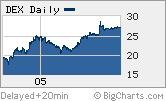 |
| Yellow pages equal green for investors: Dex Media went public in 2004 and the stock enjoyed a nice run before R.H. Donnelley agreed to buy the firm. |
|
|
|
|
|
|
|
|
|
NEW YORK (CNNMoney.com) � It seems that in the world of media, yellow is the new black.
As hard as it may be to believe, one of the hottest areas in advertising these days is a medium that many associate with yesteryear: the yellow pages.
Phone-directory publisher Dex Media (Research), which telecom firm Qwest (Research) sold to private equity firms in 2003 and was then taken public in 2004, is being bought by fellow yellow-pages publisher R.H. Donnelley (Research) for $4.2 billion.
Last week, Verizon (Research) said it might consider selling or spinning off its Information Services business, which publishes the SuperPages directories. Analysts have suggested that the unit could fetch $17 billion in a sale.
And Verizon's news has led some analysts to speculate that fellow Baby Bells AT&T (Research) (formerly SBC) and BellSouth (Research) may look to sell their online directories joint venture Yellowpages.com.
Why is there such interest in this stodgy business? One reason is that though boring, the business is stable.
According to Simba Research, a firm focusing on media and advertising trends, the entire U.S. yellow-page industry is expected to post revenue growth of about 3.3 percent this year, to $16 billion.
And that has attracted the attention of many private equity firms, which typically look for slow-growth businesses that they can spruce up and sell later on for an even higher price. That's exactly what happened with Dex Media.
"As unsexy as it may be, the yellow-pages business is hugely profitable and generates a lot of cash flow," said Greg Sterling, an analyst with Kelsey Group, a research firm that focuses on local search trends. "Directories may prove to be fairly long lived and shouldn't be seen as a wasting asset."
A dot-com advertising play
What's more, online advertising is booming and local advertising has become an increasingly important part of the mix.
"A yellow page publisher doesn't just sell yellow pieces of paper," said David Goddard, a senior analyst with Simba Research. "It is information about sellers and advertisers and those databases easily transfer online."
Several online companies already own their own Internet directories businesses.
Barry Diller's IAC/InterActive (Research) owns CitySearch while Time Warner's AOL unit has CityGuide. (Time Warner (Research) also owns CNNMoney.com.) And last year, InfoSpace (Research) bought fellow online-directory firm Switchboard.
With that in mind, directories publishers have suddenly become an important piece of the online local search game. Analysts said Verizon's directories business and Yellowpages.com could even wind up getting looked at by the likes of Google (Research) and Yahoo! (Research)
But at the end of the day, would a company like Google or Yahoo! really want to own a print publishing business, even if it does include a sizable list of advertising leads? Probably not.
"The idea of an online entity buying a directory is tantalizing because of the advertising relationships and sales channel. But integrating those two cultures would be challenging," said Sterling.
Goddard adds that while a deal for a yellow-book company could make sense for Google and Yahoo!, it would also be extremely expensive. So he thinks Verizon's directory business and other smaller regional directory companies are more likely to be scooped up by private equity firms.
But he said it might make sense for Google and Yahoo! to partner with the big directory businesses so they can gain access to their listing information. The alternative for them is to build their own databases, which could be costly.
Another company that could be active in the merger market is Britain's Yell Group (Research), which owns Yellow Book USA, the nation's largest independent (i.e. not owned by a phone company) directory publisher. Yell acquired rival TransWestern Publishing earlier this year for $1.6 billion.
Savior for the newspaper industry?
Still, other media companies might be interested in the phone book business. In fact, some suggest that one way struggling newspaper companies could revitalize their growth prospects would be by buying yellow pages publishers.
"It's something that newspapers are going to have to look at. Their online products are doing well but it's not enough to offset erosion they are seeing in circulation and classified ads," said Ken Clark, publisher of YPTalk.com, a research and consulting firm catering to the yellow pages industry.
In fact, this melding of newspapers and directories has already started to happen.
Privately held Hearst Corp, owns several newspapers as well as the White Directory, a phone book publisher based in Buffalo. And last year, Gannett (Research) bought HomeTown Communications Network, which publishes directories in Michigan, Ohio and Kentucky.
"A newspaper sales rep can say, 'I'll put you into yellow pages, online and newspapers.' They can bundle that whole thing for local advertisers and give them one bill. That's where I think newspapers could find yellow pages attractive," said Clark.
With that in mind, Sterling said it could make sense for a private investment firm to scoop up newspaper publisher Knight-Ridder (Research), which is exploring the possibility of a sale, and merge it with a yellow pages business.
"Combining those assets you could get a powerful local media company and that would be very interesting to see," Sterling said.
Everyone's gunning for Google. Click here,
For more about the newspaper industry's problems, click here.
YPTalk's Clark owns shares of R.H. Donnelley.
The reporter of this story owns shares of Time Warner through his company's 401(k) plan.

|